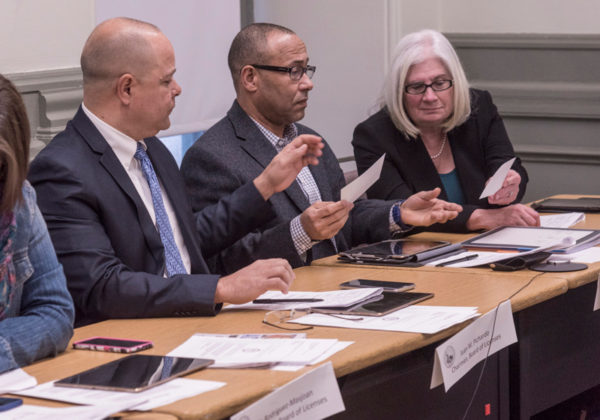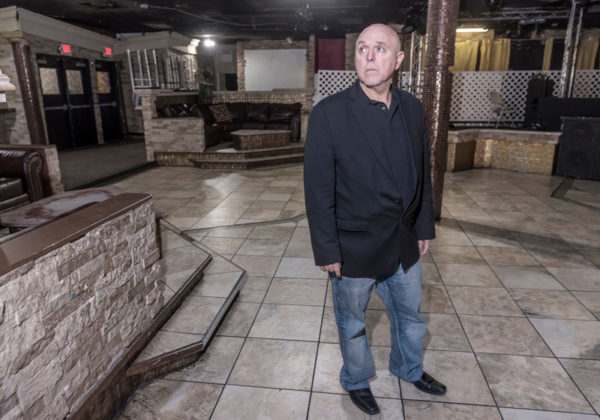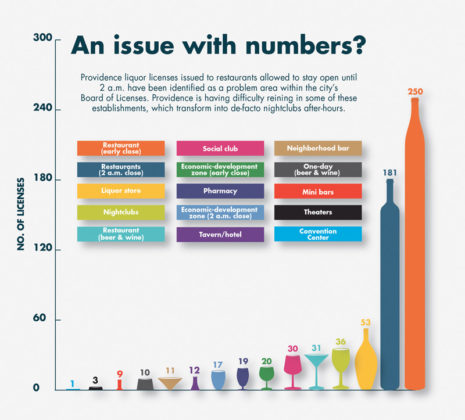
On a hot, sunny day in the fall of 2008, two Providence businessmen met at the office of the vice chairman of Providence’s Board of Licenses to pay him $52,500 in bribes.
Gordon D. Fox, then an East Side lawyer and state representative who later became House speaker, accepted the money in exchange for pushing a controversial liquor-license application through the city’s vetting process. Submitted by the owners of Shark Sushi Bar and Grill Inc., formerly on Thayer Street, the application was awarded by the board on Aug. 29, 2008. Two weeks later, Fox made his first payment on a pre-ordered, brand new 2009 Audi, valued at $50,000.
“To say that Fox’s crimes undermine the public’s confidence in their elected officials is an understatement,” wrote U.S. Attorney Peter F. Neronha, in a sentencing memorandum filed in March 2015. Fox is currently in prison, serving a three-year sentence for bribery, among other crimes.
One year after the charges Fox agreed to plead guilty to were first made public, the board is still wrestling with the public relations fallout. And despite Mayor Jorge O. Elorza’s ongoing efforts to streamline licensing and permitting in the city, complaints from license holders of inefficiency and inconsistency continue to hound the board, whose members are appointed by the mayor and paid between $19,000 and $25,000 a year.
In response, the City Council earlier this month said it has hired a law firm to conduct a comprehensive review of the board.
“The city must provide a predictable framework for businesses to operate in Providence,” said council President Luis Aponte in announcing the hiring of the law office of Lynch & Pine. “We want to ensure that fair policies and procedures are in place and make the process more effective, enforceable and consistent.”
Current board members have differing views of what changes are needed.
“The integrity [of the board] has been called into question,” Commissioner Johanna Harris wrote in her 2015 year-end report to the city. She cited the Fox case and at least one other example of alleged corruption, in which a business owner last year claimed to have paid bribes but declined to say to whom and later refused to cooperate with officials.
Harris, former board chairwoman, has recommended a host of changes in how the board operates, but told Providence Business News recently, “In many ways, the whole system should be blown up. It’s a bad system.”
The current board chairman, Sen. Juan Pichardo, D-Providence, doesn’t agree with Harris that the system needs an overhaul. But he acknowledges the board could operate more efficiently.
In his own year-end report, he promised to focus on transparency and access, education for board members and new policies and direction. He also committed to continuing fully public meetings – a point of contention on the board – and will consider holding nighttime meetings (all meetings currently begin at 1 p.m.).
‘A HOPE, A DREAM AND A MENU’
Among the chief complaints from businesses and residents is the board’s oversight of liquor licenses.
“Nightlife has overtaken the licensing board,” said Anthony Santurri, co-owner of the downtown nightclub Colosseum. He also heads the Providence Responsible Nightlife Organization and is a member of the Jewelry District Association.
Last year alone, there were 283 liquor license violations in Providence, which is a decrease from the city’s 10-year peak in 2013, when the Board of Licenses handled 566 violations. In a city of 177,994 people, there are 39 nightclub licenses, 191 liquor licenses permitted to stay open until 2 a.m., and an additional 270 liquor licenses held by restaurants required to close earlier.
There are currently 156 active liquor licenses in Warwick, which breaks down to about one liquor license for every 525 residents, according to the Warwick Police Department. In Providence, there are 683 active liquor licenses, amounting to one liquor license for every 260 residents.
Many of the regular complaints taking up the board’s time deal with illegal nightclubs, which the City Council has identified as a growing problem.
As Aponte explained, aspiring restaurateurs come before the licensing board to open an establishment, “with a hope, a dream and a menu.” But two months later, the owners have covered their windows with paper, charge an entrance fee, and operate as a nightclub, which negatively affects law-abiding license holders, he says.
Harris says these illegal operations have proliferated due to poor enforcement, lack of interagency communication and repeated leniency whenever owners end up coming before the board.
“Many of these clubs continue to operate after receiving only a small fine or a short suspension from the board,” Harris complained in her report.
Pichardo, who took over as chairman earlier this year, takes a softer view on the matter, saying there needs to be better understanding between the city and different cultures within racially and ethnically diverse Providence. He went so far as saying the city should consider a new type of license, or an alteration to the existing ones, to become more in-tune with the times.
“When you have various cultures and celebrations and an international culture, with different flavors, people celebrate in different ways,” he said. “We want to be sensitive and to hear their voice to understand their needs as we continue to create and highlight what’s best [about the process].”
License-carrying club owners, however, say the illegal establishments, mostly found in the neighborhoods, keep patrons from venturing downtown, which hurts business. The City Council conducted a study in 2012 looking at some of these issues, and is re-examining the issue, but the lack of progress to-date is disheartening to some business owners.
“In 2012, the City Council had a six-month investigative report on nightlife in Providence,” Santurri said. “Three years later, we’re doing it again. I give [the council] all the credit, but are we going to spend another six months doing this and then three years from now be doing it again?”
WHICH WAY FORWARD?
From underage drinking to incidents of violence, the board’s time is often consumed with so-called show-cause hearings, during which commissioners – along with representatives from the Solicitor’s Office and Providence Police Department – question license holders and witnesses to determine whether any action should be taken against an establishment. The process, however, is relatively unpredictable, as penalties associated with each incident are considered on a case-by-case basis.
“Businesses aren’t used to being in front of the board, so the owners are nervous wrecks,” said Peter J. Petrarca, a lawyer who claims to represent about 75 percent of the clubs and lounges in Providence that go before the board.
“If the issues don’t get dismissed, [business owners] get violated and they have to pay more money to go before the Department of Business Regulation,” which is the state department with superseding power over the local board.
Any hearing that stems from violence typically draws a large amount of public attention, as for example in 2014 when a man was beaten to death outside of the $3 Bar on Atwells Avenue. Community members turned out in droves to speak out against the embattled watering hole, which eventually had its license revoked after a high-profile battle with the board.
Such hearings were not always so public. Harris, who served as chairwoman from 2014-15, did away with preconference hearings, which used to permit the chairperson, along with the city solicitor, to meet with a business owner in private to come up with a deal before the meeting was made public.
Petrarca argues the preconference hearings should come back, calling the public hearings as they exist today a “spectacle” that unnecessarily lengthens the process for everyone involved. But open-government advocates balk at the idea of reinstating closed-door meetings, especially at the Board of Licenses meetings.
“No public body in Providence, save for the City Council, draws as much interest or scrutiny as the Board of Licenses. Given the immediate and direct impact their decisions have on residents of the city, it’s critical that they conduct themselves in a transparent fashion that allows the press and citizens to observe their work,” said John Marion, executive director of Common Cause Rhode Island.
SLOW PROGRESS
Former Mayor Angel Taveras started his administration in 2011 with the goal to streamline permitting and licensing in the city.
He was successful to some degree with permitting, effectively setting up a digital system called ProvSmart, which allows businesses to track multiple permits for small projects that don’t require zoning relief or review from the City Plan Commission.
But less progress was realized on the licensing side, which until last year was still done entirely on paper and could send business owners bouncing between several different departments for simple licenses, such as outdoor seating for summer months. The process, in many ways, has improved since Elorza last year hired Nicole Pollock, his chief innovation officer, to re-examine how the city does business. Pollock and her two-member staff spent 120 hours observing operations within the Licensing Department before recommending a host of changes designed to improve the process for both the department and the customer.
“They needed to move into 2016 [because] they were caught in a different era,” Pollock said.
Some of those recommendations have already improved the process, according to Serena Conley, license administrator.
Pollock is also working to digitize the department’s records, and expects some less-involved licenses to be accessible on a new online platform within the next six to eight months.
Arnold “Buff” Chace, managing partner at Cornish Associates LP, thinks the licensing process has improved through the last decade. “It’s a clunky process, but things change,” he said.
But not everyone sees it that way.
TRYING TO MAKE A DIFFERENCE
Kaitlyn C. Roberts is the owner of the Providence catering company Easy Entertaining Inc., which employs 25 people and did $1 million in sales last year. What time Roberts doesn’t spend making food for parties, or private events at her facilities on Valley Street, is spent helping nascent businesses move through the city’s opaque licensing process.
“It’s all bad, it’s all disorganized, but unfortunately where most of the issues come up are in the interpretation of rules and regulations that exist,” she said.
The impetus for Roberts’ efforts stem from her own experience dealing with the city. In 2013, she came before the city for a liquor license to serve beer and wine. Despite owing nothing to the state and having all of her documents in order, it wasn’t until six months later after she made a call to her state representative that the license was even considered before the board. Once in front of the board, Roberts said, it took only a matter of minutes to approve. The convolution and seeming need to know a guy to get something done is what discourages business here, she says.
“I want businesses to succeed here, but I can totally understand why they don’t want to come, and that’s unfortunate,” she said.
“The bottom line is, it hasn’t improved at all,” Commissioner Harris told PBN.
Much of the bureaucracy associated with Providence licensing is similar to what’s found in other Rhode Island municipalities, according to Petrarca, who represents clients in other communities.
But because Providence is the state’s largest city, it processes the most licenses while using an antiquated system. Business leaders say these inefficiencies open the door for mistakes and delays.
Licensing and permitting in Providence are often cited as problems by local businesses, according to Laurie White, president of the Greater Providence Chamber of Commerce. She hears similar issues brought up from surrounding communities.
“There’s no place right now that really excels at it,” she said. “From what I’m able to glean from talking with people is that it’s still clunky, paper-based and manual,” she said.
Chris Harris, owner of downtown’s Club Ego, has worked in establishments in other cities, including Boston, where he says the city was typically clearer about what’s required of establishments when they open, operate and have to respond to violations.
“In Boston, everyone knows what a nightclub is. In Providence, it seems less clear,” he said.
There’s hope on the horizon, however, according to White, who says the overall licensing process could improve if the state is able to expand its e-permitting, which would bring some commonality to systems between communities. Gov. Gina M. Raimondo has proposed $500,000 in her fiscal 2017 budget to expand e-permitting to more municipalities.
“If you can do what you need to do in a couple of clicks and without the inconsistencies of manual, paper-based processes, that’s what businesses are looking for. It’s all about speed and predictability,” she said. “Tell me no, or yes, but tell me fast.”
While the board can continue to look for ways to operate more efficiently, restoring its reputation after the Fox scandal may be even more challenging.
“The fact that one of the board members, who also happened to later become our House speaker, admitted to taking a bribe in return for granting a liquor license only highlights that the board deserves extra scrutiny,” Marion said. •















